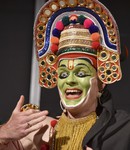
The Artist
Here is a new Video-Potrait about me from Freiburg!
Video: "Ich sehe mich als Brückenbauer"
More information: vonhier-doku
My name is Hartmut Schmidt - but I am also known under the artist's name of Harianu Harshita - and I was born in a small town just south of Siegen in the German federal state of North Rhine-Westphalia. In 1989 I moved to the southwest German city of Freiburg, got married there and since 1999 I am the father of twins. This is also where my artistic training took off in earnest. I attended courses in pantomime, modern dance and dance meditation.
Study in India:
June 91 till April 94 study of Ōṭṭan-, Śῑtankan- and Parayan Thullal at the State
Academy of Arts Kerala Kalamandalam and in private tuition with Smt. Kala-
mandalam Devaki
August 93 start with lessons in Mizhavu (Classical Temple drum) at Kerala Kala-
mandalam with Shri Kalamandalam Iswaran Unni
July 92 till April 94 Scholarship from the Indian Council for Cultural Relations
(ICCR), New-Delhi
January 96 till April 96 continue of the Thullal study with Smt. Kalamandalam
Devaki and Mizhavu at Kerala Kalamandalam
July 98 till May 99 continue of the Thullal study with Smt. Kalamandalam Devaki
and special training in Parayan Thullal under Shri Divakaran Nair (Retired Prof. in
Thullal at Kerala Kalamandalam) Scholarship from Hermann-Gundert-Society
Stuttgart, Germany
October 01 till January 02 continue of the Thullal study with Smt. Kala-
mandalam Devaki and Shri Divakaran Nair. Further on special lessons in Parayan
Thullal with Shri Kalamandalm Prabhakaran. Scholarship from Hermann-
Gundert-Society Stuttgart, Germany
October 04 till March 05 study of a complete story in Śῑtankan Thullal under
Shri Kalamandalam Prabhakaran. Scholarship (Orientation Grant) from ICCR,
New-Delhi
October 09 till November 09 advanced studies in Śῑtankan Thullal under
Shri Kalamandalam Prabhakaran and research. Scholarship (Orientation Grant)
from ICCR, New-Delhi
July 13 till September 13 Research and performance of Thullal in Kerala
and translation of the complete story Kumbhakarṇṇa Vadham (Parayan Thullal)
December 15 till January 16 Research and performance of Thullal in Kerala
October 7th till November 14th 2022 Research and Perfromance of Thullal in Kerala. Presentation of Puḷindῑ Mōkṣam in Parayan Thuḷḷal at the Kerala Kalamandalam University within the 65th Anniversary Celebrations of the Department of Thullal on 29th October.
My repetoire
During the total of five years that I studied in Kerala I learned six excerpts and complete Thuḷḷal stories in Malayāḷam and performed more than forty times at temple festivals and universities (Rāmānu Caritam, Kalyāṇasaugandhika, Puḷindῑ Mōkṣam, Kṛṣṇalῑla, Gajēndra Mōkṣam, and Antaka Vadham, the length of the performances being between 30 and 75 minutes).
My first Thuḷḷal performance (Arangēttam) took place on April 03, 1992 in front of the renowned Śrῑ-Kṛṣṇa-Temple in Guruvāyūr. Aside from the stories mentioned above I translated a number of other important parts from further Thuḷḷal texts, in all some 4000 lines from the poetics of Kunchan Nambiar which date back to the 18th century. The basis of my artistic work with children and adults in Germany is currently a repertoire of six stories (Puḷindῑ Mōkṣam, Kalyāṇasaugandhika, Pūtana Mōkṣam, Gajēndra Mōkṣam, Antaka Vadham and Kumbhakarṇṇa Vadham, the length of the performances being between 35 and 60 minutes) which I translated into German.
My artistic work
"Building little bridges between cultures" is my motto.
I want share with the people here in the West the experiences that I made in India in as many ways as possible. To be able to pass on the wealth of knowledge that I have built up since 1991, some of it through very personal and close relationships with Indians both here in Germany as well as in India itself.
Project days in schools and performances in front of children provide me with the opportunity to convey some of the Indian zest for life, the imaginative storytelling and the so completely different everyday culture. I also hope to be able to promote an openness and acceptance towards people from other cultures. Foreignness and Otherness should awaken curiosity. Curiosity towards those who look different and live differently. Perhaps also some curiosity towards other lifestyles - like that of an artist?
Performances for adults focus more on the art form of Thuḷḷal with its fascinating means of expression and stories. Humour, philosophy and social criticism are unmistakable features in the texts. Laughter is allowed when the chaos of a world is described in which nobody can die:
"in the ocean a giant fish swallows a smaller one -
only to have him peeping, undigested, from of its bum" From: Antaka Vadham
Of a more contemplative nature are stories such as that of the Kaliyuga, an age in which wickedness and evil keep spreading (Pūtana Mōkṣam). Others, like Puḷindῑ Mōkṣam tell about the equality of humankind - and it is the wife who gets to express philosophical truths at the end, not her husband.


